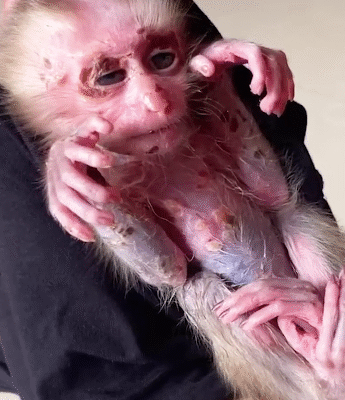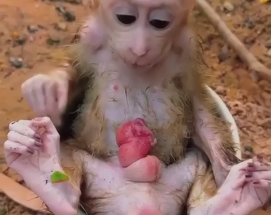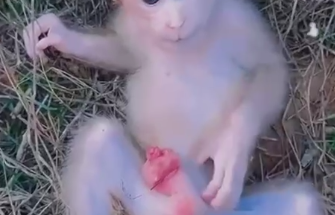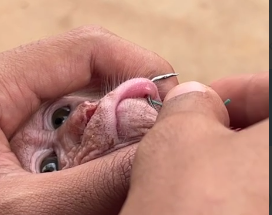In a quiet village bordering a lush green forest, the morning sun rose gently, casting long golden rays over the trees. Life stirred slowly — birds chirped, leaves rustled, and somewhere in the distance, a soft, heartbreaking sound echoed through the forest. A cry. Weak, desperate, and unmistakably from a baby monkey.
A few villagers walking along a dirt path stopped. One of them, an old woman named Shanta, motioned for silence. “Did you hear that?” she asked. Everyone fell quiet, listening. The cry came again, more insistent this time.
Following the sound, they discovered a tiny baby monkey lying motionless near a fallen tree. His small body was trembling, and his eyes blinked slowly, as though exhausted from crying. He was barely a few weeks old — too young to survive on his own.
His fur was dirty, his limbs weak, and there were small scratches on his face and belly. Most tragically of all, there was no sign of his mother or his troop.
The villagers guessed what had happened: perhaps his family had been chased off by a predator, or maybe he had fallen from the trees and been left behind. Regardless of the reason, one thing was clear — he was now an orphan, and he needed help fast.
The Call for Help
Shanta quickly called the nearby wildlife rescue center. Within an hour, a small rescue van arrived, and out stepped Raju, a compassionate young wildlife caretaker with a calm, experienced demeanor. He gently approached the baby monkey, speaking softly and holding out a warm towel.
“It’s okay, little one,” he said. “You’re safe now.”
The baby monkey didn’t resist. He had no strength left. He curled into the towel, whimpering softly, and let himself be lifted into Raju’s arms.
“We’ll call him Mikku,” Raju said. “It means ‘small and sweet’ — just like him.”
First Days of Healing
At the wildlife center, Mikku was placed in a quiet, warm enclosure lined with soft blankets and stuffed animals for comfort. The vet, Dr. Priya, examined him carefully. He was dehydrated, bruised, and malnourished — but thankfully, no bones were broken.
His treatment began right away: warm milk through a syringe, gentle cleaning of his wounds, and constant warmth and affection. A heating pad was placed under his bedding to mimic the warmth of his mother’s body.
The first night was the hardest. Mikku cried softly, looking around as if searching for the family he had lost. But Raju stayed by his side, speaking to him gently and rubbing his back with a soft cloth.
“You’re not alone anymore,” he whispered. “You have a new family now.”
A New Routine
Over the next few weeks, Mikku slowly began to recover. His appetite improved, and he began to gain weight. He clung tightly to a plush monkey toy, which he treated like a companion — cuddling it when he slept, climbing on it when he played.
Raju and Dr. Priya developed a daily routine for him. Mornings started with warm milk, followed by supervised playtime in a small indoor jungle gym. Mikku learned to climb again — first short ropes, then wooden branches — rebuilding his strength and coordination.
In the afternoons, he was taken outside into a protected enclosure where he could feel the breeze and see other monkeys from a distance. His big, curious eyes watched them closely. He was learning, observing, and adapting.
One day, Raju brought in a new addition to Mikku’s life — a slightly older rescued monkey named Lali. She had been orphaned too, and although shy at first, she slowly warmed up to Mikku.
The two became inseparable.
A New Home
As Mikku grew stronger, the team realized it was time to give him and Lali a more natural space — a semi-wild enclosure at the edge of the sanctuary. Designed to mimic the forest, it had trees to climb, platforms to leap from, and hidden spots to explore.
“This is your new home now,” Raju told Mikku as he gently placed him on a low branch. Mikku looked around cautiously, then jumped to another branch, followed closely by Lali.
Over the next days, Mikku flourished in his new environment. He explored every corner, climbed higher each day, and played endlessly with Lali. The two chased butterflies, shared fruits, and cuddled during naps in the trees.
The enclosure also had other monkeys — some older, some younger — and Mikku began to bond with them too. He was learning how to be a monkey again — wild, social, curious, and full of life.
A Second Chance
By now, Mikku was unrecognizable from the weak, trembling orphan found by the roadside. His fur was shiny, his eyes were bright, and he moved with agility and joy. He had found not just safety, but a new beginning — a second chance at the life he almost lost.
Raju often visited, watching from outside the enclosure. “You’ve come so far, little one,” he said one day, tears in his eyes. “I hope one day you’ll be strong enough to return to the forest where you belong.”
But for now, the sanctuary was his safe space — a home where he was loved, cared for, and given every chance to heal and grow.
A Message of Hope
Mikku’s story is just one of many. Every year, countless baby monkeys are orphaned due to deforestation, hunting, or accidents. Many don’t survive. But with care, compassion, and support, some — like Mikku — get a new home, new friends, and a second chance.
Raju and the team at the sanctuary continue their mission every day: rescuing, healing, and releasing animals whenever possible. Their hope is that one day, wild habitats will be safer — and that every animal, no matter how small, will get the love and care they deserve.
Until then, the sanctuary doors remain open, and hearts like Mikku’s continue to find a place to call home.



